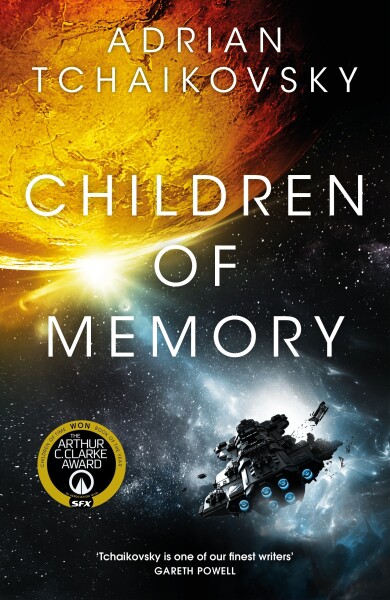SNQ: Adrian Tchaikovsky’s “Children of Memory”
by Miles Raymer

Summary:
Children of Memory is the third volume in Adrian Tchaikovsky’s “Children of Time” series. Tchaikovsky continues to build on the evolutionary concepts and thought experiments from the previous two books, this time taking the story in a mysterious and surprising new direction. When an eclectic crew of interstellar adventurers discovers Imir––a partially-terraformed planet colonized by refugees from a dying Earth––they are eager to learn about these new people and their culture. But they soon find themselves drawn into a dark and dizzying tribal mythology with a historical timeline that no one can properly pin down. What follows is a brilliant and thrilling narrative meditation on the nature of identity, the delights and horrors of conscious experience, and the common bonds that unite all sentient creatures. With Children of Memory, Tchaikovsky once again earns his place among our most elite contemporary science fiction writers.
Key Concepts and Notes:
- Children of Memory represents a significant tonal and structural shift for this series. Much of the book reads like a classic mystery laced with fairy tale elements. Tchaikovsky pushes his creativity to the limit, and the results are stunning. This novel couldn’t exist without its two excellent predecessors, but in my opinion it surpasses them in both its emotional and philosophical impact.
- Readers familiar with the series will know that Tchaikovsky has an unmatched talent for imagining divergent forms of intelligence, including genetically “uplifted” animal species such as spiders and cephalopods. Memory adds yet more players to this intellectual orchestra, most notably a dyad of hyper-clever corvids and the “Interlocutor,” a cooperative fusion of all the lifeforms that have come into contact with the Nodan organism from the second novel. The theme of identity is front and center here, especially the question of how continuity of identity can be preserved in a society with the technology to transfer entire personalities and autobiographical memory structures into a variety of substrates. The corvids also provide incisive commentary on how conscious experience is not required for an agent to exhibit complex, coherent, and collaborative forms of intelligence.
- Memory made me realize that Tchaikovsky is boldly taking on the ethical question at the heart of Iain M. Banks’s beloved Culture Novels, which is similar to the “prime directive” concept from Star Trek. Now that Tchaikovsky’s explorers can travel quickly between solar systems and expand their civilization accordingly, they will have to develop better moral and logistical protocols for how to deal with “less advanced” cultures and novel ecologies. The question of cosmic intervention is never an easy one.
- Finally, it’s worth noting just how beautifully Tchaikovsky captures the spirit of scientific curiosity and that drives us to explore and understand the universe. These books are a triumphant tribute to the infinite possibilities that await us if we keep surviving, keep learning, keep building, and keep befriending rather than trying to destroy one another.
Favorite Quotes:
You will fail, and when you do, you must do everything you can to fail as little as possible. Don’t let the failure get its teeth into you. (18)
Things fall apart…and entropy is the landlord whose rent always gets paid. (67)
We travel because we wish to find out. We call our discoveries across the stars, each to each. We come running at the promise of something new. We seek for every possibility of life and sentience, because the universe is vast and cold and mostly empty, and variance from that void is to be treasured. (83)
Friends. Reaching into a murky pool of faces and stirring it up until the right visage floated to the surface. It was good to make friends in the vast and empty universe. And, although the others in the crew were the friends they’d made, they also held all the friends they needed within themselves. Sometimes the friends you met along the road were within you all along. (177-8)
Because their culture was heavily based on scientific method, and nobody wanted to look a fool, they spent quite a lot of time trying to disprove it. The universe was full of things that seemed laden with intent until they turned out to be nothing more than the voice of mindless celestial mechanics. Anything too regular was likely to be natural, like the constant time-keeping of a pulsar. Anything too random was likely to be natural, no more than contours in the peach-fuzz of background radiation. (343-4)
The essential fallacy…is that humans and other biologically evolved, calculating engines feel themselves to be sentient, when sufficient investigation suggests this is not so. And that sentience, as imagined by the self-proclaimed sentient, is an illusion manufactured by a sufficiently complex series of neural interactions. A simulation, if you will. On this basis, either everything of sufficient complexity is sentient, whether it feels itself to be or not, or nothing is…We tend towards the latter. We know we don’t think, so why should anything else? (444-5)
Knowledge. New, shiny things. Better thinkers than we have observed that, when you reach this level of post-scarcity civilization, it’s either wallow in your own excesses forever or seek out newness. Knowledge and understanding is the crown atop the hierarchy of needs, the thing you can’t have enough of. (472)